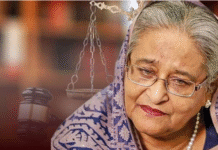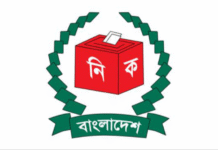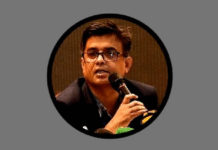Tensions boiled over this week as opposition supporters descended on the capital ahead of a major demonstration against the government of Prime Minister Sheikh Hasina.

DHAKA, Bangladesh — The authorities in Bangladesh arrested two senior opposition leaders early on Friday, capping off a week of political tensions, including a major clash between the police and opposition supporters that left at least one demonstrator dead, dozens wounded and hundreds arrested.
Human rights groups say Prime Minister Sheikh Hasina has intensified a crackdown against her opponents as the South Asian nation with a population of 165 million prepares for general elections next year. She has been in power for more than a decade, a tenure marked by authoritarian control and impressive economic growth that appears to be waning in the wake of the pandemic and Russia’s invasion of Ukraine.
Mirza Fakhrul Islam Alamgir and Mirza Abbas, senior members of the opposition party, the Bangladesh Nationalist Party, were arrested by plainclothes security personnel in a predawn raid, the wives of both men said. With Khaleda Zia, the former prime minister and leader of the B.N.P. under house arrest and barred from politics, Mr. Alamgir, the general secretary, has been the de facto leader of the opposition since Ms. Zia’s arrest in 2018.
“Four men came to the apartment we live in and said they are taking him with them,” said Rahat Ara Begum, Mr. Alamgir’s wife. “When they were asked why they were doing it, they said they were ordered to detain him by the higher authority. But they did not say who the higher authority was.”
“They led their supporters, instigated them to fight against the police,” Mr. Hossain said of the arrests.

Ms. Hasina, the daughter of Bangladesh’s founding leader after the country split from Pakistan in the 1970s, has continued Bangladesh’s long history of often brutal winner-takes-all politics, deploying the laws and law-enforcement against opponents and activists. Under her rule, Bangladesh’s special forces, the Rapid Action Battalion, have been accused of turning into a death squad. While the force’s reputation for brutality precedes Ms. Hasina taking office in 2009, it was sanctioned by the United States government during her watch, with some of its current and former leaders being accused of hundreds of extrajudicial killings.
In recent years, Ms. Hasina’s government has employed a digital security law to arrest journalists, activists and opposition members, some for minor offenses such as making critical comments about her handling of Covid on Facebook. In the past two years, more than 2,000 people have been detained under the law, which the United Nations says “imposes draconian punishments for a wide range of vaguely defined acts.”
As she targeted her critics, Ms. Hasina tried to emphasize her country’s economic success, with Bangladesh touted by the World Bank as an “inspiring story of growth” for managing to slash poverty and grow its G.D.P. per capita larger than neighboring India’s.
But just as the economy was beginning to emerge from the coronavirus pandemic, the blowback of Russia’s invasion of Ukraine kicked in. Rising prices around the world have reduced the demand for exports, while increases in food and oil prices have hurt citizens at home. The reduction in exports has resulted in a fall in foreign reserves, forcing Bangladesh to reach out to the International Monetary Fund for $4.5 billion in assistance.
Since July, the opposition has tried to mobilize around the economic stress, organizing nearly a dozen large rallies in different parts of the country. Maruf Mallick, a lecturer and analyst of Bangladesh politics based in Germany, said the economic stress and the fact that the opposition has been able to rally large numbers of people despite government resistance has Ms. Hasina and her officials worried.
“The government feels that if this situation continues, they may be in danger,” Mr. Mallick said. “And to cover this weak situation they are trying to attack political opponents.”
As clashes intensify, human rights groups say Ms. Hasina’s government has responded in a one-sided manner, protecting her supporters while implicating the opposition in myriad cases where the police lists hundreds of “unidentified” people as suspects — a tactic that, rights activists say, is then used as a free hand in targeting political opponents.

The police accused the supporters of “vandalism and obstruction of police work” and carrying Molotov cocktails, rounding up about 300 of them and calling them “terrorists.”
“We gathered there like we generally do. The police suddenly came and started to beat our supporters. They exploded sound grenades, they used guns. They barred me from entering the party office and arrested our people,” Mr. Alamgir, the B.N.P.’s de facto leader, told local news media before his arrest. “No doubt they are plotting something against us. I don’t know what they are doing inside our office.”
Over the past week, 15 foreign embassies in Dhaka put out a joint statement emphasizing the right to peaceful protest.
“As Bangladesh is coming closer to its national election next year, we remind Bangladesh of its commitments, as a U.N. member state, to free expression, media freedom, and peaceful assembly among others written in the Declaration,” said Gwyn Lewis, the U.N. resident coordinator in Bangladesh.
After the U.S. ambassador to Bangladesch, Peter D. Haas, urged an investigation into the political violence this week and called for the protection of “the fundamental freedoms of expression, association, and peaceful assembly,” a senior aide to Ms. Hasnia fired back, pointing at election disputes and gun violence in the United States.
“Sheikh Hasina will not bow down to anyone’s order or interference,” Obaidul Quader, a cabinet minister and the ruling party’s general secretary, told a meeting of party leaders. “She does not fear anyone except Allah.”
Saif Hasnat reported from Dhaka, Bangladesh, and Mujib Mashal from New Delhi.
Mujib Mashal is The Times’s bureau chief for South Asia. Born in Kabul, he wrote for magazines including The Atlantic, Harper’s and Time before joining The Times. @MujMash











